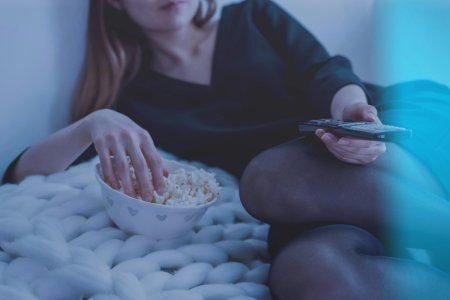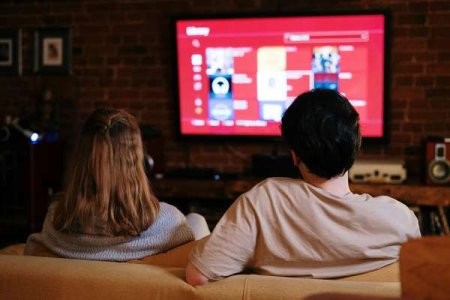Is reality TV "harmful"? We asked 5 experts—including an ex-reality TV participant
- Replies 0
Reality TV–love it or hate it, there’s no denying it’s addictive.
From explosive arguments to over-the-top love triangles, it can be hard to look away. But is all this drama just for fun, or might it do more harm–to watchers and participants–than we realize?
We asked five experts, and most of them said it might, especially when it comes to promoting negative body image and leaving contestants emotionally scarred.
But one expert argued reality TV is a valuable form of entertainment overall, which reflects modern culture and sparks important conversations.
Here are their detailed responses:
Senior Lecturer in Communication Studies and former reality TV contestant
Yes. Watching reality TV content created at the expense of participants is harmful. Different reality TV formats have varying levels of participant immersion. Shows that isolate contestants from support systems–banning phones and internet so they’re completely reliant on the crew–are the most harmful.
It’s unacceptable that any number of former reality TV participants have passed away from suicide. As a former participant of The Bachelor New Zealand, I spent six and a half weeks either in an isolated mansion, or overseas with no return flight until eliminated.

With no running water, food kept under lock and key and chicken served from a rubbish bin, we were reminded of how we could not choose to leave and how “worth it” the bachelor was (he wasn’t).
We were taped to mics the entire time, including when we went to the bathroom. After returning home, I found myself automatically reaching for a mic that wasn’t there to distort the recording of family conversations. I had panic attacks and lost 12% of my body weight in two weeks.
As an academic studying reality TV, I think these shows must be informed by research into defining “post-traumatic reality show syndrome”. Participants’ experiences have long-lasting effects, but technically can’t be labelled PTSD due to a requirement of “exposure to actual or threatened death, serious injury or sexual violation”.
There are also wider effects, particularly for participants’ family members, who effectively lose a loved one for a period of time and then must support their return back to the world.
Senior Lecturer in Media
No. The idea that there is a direct correlation between what we consume and how we behave (often called the “media effects” model) has long been disproven.
Yes, reality TV has a social and cultural impact, but it is not as simple as watching antisocial behavior on a screen and then being more likely to repeat it in real life. Despite watching many hours of Real Housewives, I have never flipped a table or thrown a drink in someone’s face.
I have, however, spent many hours defending the cultural value of reality TV. Why is the gossip, manipulation and political struggles of Westeros or the Roy family considered “art”, but the same power games in the Bachelor mansion considered a “guilty pleasure”? Is it because the stakes are lower in the latter? Surely not, as they’re both constructed.
It’s usually media aimed at women which ends up being labelled as “trashy” or a “guilty pleasure”. Reality TV’s perceived lack of cultural value reflects a long history of classed, raced and gendered taste cultures.
Reality TV is a space where contemporary cultural debates play out – whether its questioning problematic relationship dynamics in Married at First Sight, the boundaries of heteronormativity in The Bachelorette, or the norms and demands of parenting in Parental Guidance. These conversations continue into homes and workplaces.
The negative impacts of reality TV largely land with those involved in production. Our cultural devaluing of these shows has led to horrendous working conditions being excused because contestants “knew what they were getting into”.
Associate Professor of Psychology
Yes. An important feature of human cognition is the ability to learn from the knowledge and skills of more experienced individuals.
From early infancy, we learn new behaviors by watching and copying others’ actions. While our beliefs about how people should behave develop through family and peer group interactions, media exposure can further broaden our experiences.

During early childhood, we learn less from on-screen events than real-life interactions. But we become better at learning from media resources with age, and when the content is meaningful and relevant.
Online video platforms such as YouTube provide access to a vast body of information for learning and entertainment. As content is created, shared and commented on by online communities, we can select the best resources for our needs.
At their best, reality shows can expose us to people from a range of backgrounds, races and genders. But this often comes at the risk of exposure to the antisocial attitudes and toxic behaviors of a minority.
While bullying, bigotry or misogyny might increase viewer numbers, repeated viewing of such content may be unhealthy, as repetition can enhance encoding and memory. In this way, antisocial behaviors may become normalised.
Having the production team cut away partway through controversial acts is also unlikely to help. Even infants successfully complete actions they have observed someone trying but failing to achieve. The intention has already been planted.
Reality television can be entertaining, but a reality check is needed. The voices that draw our attention may not be the ones that need magnifying.
Source: TIME / Youtube.
Senior Lecturer in Clinical Psychology
Yes. I’m a clinical psychologist and academic with expertise in the field of eating disorders and body image.
Reality TV encompasses a broad range of programs, from celebrity dramas to dating shows, to lifestyle competitions. While the genre as a whole is very popular, evidence suggests some shows may be more harmful than others.
Studies have shown reality TV can lead to negative body image in viewers, particularly shows that are appearance-focused, and in which idealized body types are promoted over a diverse range.
One survey by the Mental Health Foundation showed almost a quarter of young adults said shows such as Love Island caused them to worry about their body image. These concerns were also associated with mental health problems such as depression, anxiety and suicidal thoughts.
Poor body image can also lead to other negative outcomes in young people, such as skipping school, according to a survey by The Butterfly Foundation.
Humans are naturally drawn to making social comparisons. And negative body comparisons are central to problematic body image. Certain reality shows may increase these comparisons, resulting in a range of negative outcomes that span body image and mental health.
More research is needed to explore reality TV’s full impact on body image and mental health and how we may reduce it. Our research group is currently evaluating a program called BodyKind Online Education, designed to help young people protect themselves against the media’s potentially harmful effects on body image. The full results are due to be published soon.
Source: 11Alive / Youtube.
Senior Lecturer in Literature, Film, Television and Feminism
Yes. The harms posed by certain reality TV shows should not be underestimated. Their labeling as “trashy” TV highlights their tawdry, shallow content, which is often devoid of meaningful enrichment or intellectual value.
Franchises such as The Bachelor/Bachelorette, Love Island and Married at First Sight exemplify this trend. They cater to viewers’ voyeuristic tendencies by staging drama that appeals to our basest instincts.
Voyeurism–defined as an interest in observing unsuspecting people–can become damaging when the subjects are objectified and dehumanized. And research linking voyeurism to television habits shows people drawn to reality TV tend to score significantly higher on a “voyeurism scale”.
Reality TV’s treatment of contestants perpetuates a culture of dehumanisation for entertainment. There are many reports of contestants facing psychological and physical harm, sometimes leading to anxiety and stress disorders. In extreme cases, contestants have taken their lives following online abuse stemming from their TV appearance.
And while some reality shows produce inspiring figures, many leave their participants feeling humiliated.
In some ways, “trashy” reality TV mirrors the Roman Colosseum. Contestants are the modern-day gladiators, battling for love, fame and Instagram followers. Audiences can live vicariously through their favorites, while hoping for others’ dismissal or ridicule. This phenomenon is captured by the German word schadenfreude (pleasure derived from others’ misfortune).
Finally, reality TV can also impact viewers’ self-image. According to one survey, about one in four people said reality TV made them worry about their body image.
Disclosure statements
Rebecca Trelease was a participant on season two of The Bachelor New Zealand in 2016, produced by Warner Bros International Television NZ.
Jessica Ford does not work for, consult, own shares in or receive funding from any company or organization that would benefit from this article, and has disclosed no relevant affiliations beyond their academic appointment.
Jane Herbert does not work for, consult, own shares in or receive funding from any company or organization that would benefit from this article, and has disclosed no relevant affiliations beyond their academic appointment.
Catherine Houlihan has received research funding from the Butterfly Foundation and consults clinically to Wandi Nerida, an organization owned and operated by the Butterfly Foundation.
Suzie Gibson does not work for, consult, own shares in or receive funding from any company or organization that would benefit from this article, and has disclosed no relevant affiliations beyond their academic appointment.

Have you ever watched a reality show that left you feeling uncomfortable or concerned for the people involved? Do you think these programs reflect our culture—or are they shaping it in ways we don’t always notice? Share your thoughts and stories in the comments below!
From explosive arguments to over-the-top love triangles, it can be hard to look away. But is all this drama just for fun, or might it do more harm–to watchers and participants–than we realize?
We asked five experts, and most of them said it might, especially when it comes to promoting negative body image and leaving contestants emotionally scarred.
But one expert argued reality TV is a valuable form of entertainment overall, which reflects modern culture and sparks important conversations.
Here are their detailed responses:
“Yes, It Can Be Harmful”
Rebecca TreleaseSenior Lecturer in Communication Studies and former reality TV contestant
Yes. Watching reality TV content created at the expense of participants is harmful. Different reality TV formats have varying levels of participant immersion. Shows that isolate contestants from support systems–banning phones and internet so they’re completely reliant on the crew–are the most harmful.
It’s unacceptable that any number of former reality TV participants have passed away from suicide. As a former participant of The Bachelor New Zealand, I spent six and a half weeks either in an isolated mansion, or overseas with no return flight until eliminated.

Reality TV contestants may endure isolation, stress, and lack of privacy—conditions that can lead to lasting emotional harm. Image source: JESHOOTS / Pexels.
With no running water, food kept under lock and key and chicken served from a rubbish bin, we were reminded of how we could not choose to leave and how “worth it” the bachelor was (he wasn’t).
We were taped to mics the entire time, including when we went to the bathroom. After returning home, I found myself automatically reaching for a mic that wasn’t there to distort the recording of family conversations. I had panic attacks and lost 12% of my body weight in two weeks.
As an academic studying reality TV, I think these shows must be informed by research into defining “post-traumatic reality show syndrome”. Participants’ experiences have long-lasting effects, but technically can’t be labelled PTSD due to a requirement of “exposure to actual or threatened death, serious injury or sexual violation”.
There are also wider effects, particularly for participants’ family members, who effectively lose a loved one for a period of time and then must support their return back to the world.
“No, the Effects Aren’t That Simple”
Jessica FordSenior Lecturer in Media
No. The idea that there is a direct correlation between what we consume and how we behave (often called the “media effects” model) has long been disproven.
Yes, reality TV has a social and cultural impact, but it is not as simple as watching antisocial behavior on a screen and then being more likely to repeat it in real life. Despite watching many hours of Real Housewives, I have never flipped a table or thrown a drink in someone’s face.
I have, however, spent many hours defending the cultural value of reality TV. Why is the gossip, manipulation and political struggles of Westeros or the Roy family considered “art”, but the same power games in the Bachelor mansion considered a “guilty pleasure”? Is it because the stakes are lower in the latter? Surely not, as they’re both constructed.
It’s usually media aimed at women which ends up being labelled as “trashy” or a “guilty pleasure”. Reality TV’s perceived lack of cultural value reflects a long history of classed, raced and gendered taste cultures.
Reality TV is a space where contemporary cultural debates play out – whether its questioning problematic relationship dynamics in Married at First Sight, the boundaries of heteronormativity in The Bachelorette, or the norms and demands of parenting in Parental Guidance. These conversations continue into homes and workplaces.
The negative impacts of reality TV largely land with those involved in production. Our cultural devaluing of these shows has led to horrendous working conditions being excused because contestants “knew what they were getting into”.
“Yes, But It’s About Repetition”
Jane HerbertAssociate Professor of Psychology
Yes. An important feature of human cognition is the ability to learn from the knowledge and skills of more experienced individuals.
From early infancy, we learn new behaviors by watching and copying others’ actions. While our beliefs about how people should behave develop through family and peer group interactions, media exposure can further broaden our experiences.

Shows that promote idealized body types can contribute to poor body image, anxiety, and depression, especially among younger viewers. Image source: cottonbro studio / Pexels.
During early childhood, we learn less from on-screen events than real-life interactions. But we become better at learning from media resources with age, and when the content is meaningful and relevant.
Online video platforms such as YouTube provide access to a vast body of information for learning and entertainment. As content is created, shared and commented on by online communities, we can select the best resources for our needs.
At their best, reality shows can expose us to people from a range of backgrounds, races and genders. But this often comes at the risk of exposure to the antisocial attitudes and toxic behaviors of a minority.
While bullying, bigotry or misogyny might increase viewer numbers, repeated viewing of such content may be unhealthy, as repetition can enhance encoding and memory. In this way, antisocial behaviors may become normalised.
Having the production team cut away partway through controversial acts is also unlikely to help. Even infants successfully complete actions they have observed someone trying but failing to achieve. The intention has already been planted.
Reality television can be entertaining, but a reality check is needed. The voices that draw our attention may not be the ones that need magnifying.
Source: TIME / Youtube.
“Yes, Especially for Body Image”
Catherine HoulihanSenior Lecturer in Clinical Psychology
Yes. I’m a clinical psychologist and academic with expertise in the field of eating disorders and body image.
Reality TV encompasses a broad range of programs, from celebrity dramas to dating shows, to lifestyle competitions. While the genre as a whole is very popular, evidence suggests some shows may be more harmful than others.
Studies have shown reality TV can lead to negative body image in viewers, particularly shows that are appearance-focused, and in which idealized body types are promoted over a diverse range.
One survey by the Mental Health Foundation showed almost a quarter of young adults said shows such as Love Island caused them to worry about their body image. These concerns were also associated with mental health problems such as depression, anxiety and suicidal thoughts.
Poor body image can also lead to other negative outcomes in young people, such as skipping school, according to a survey by The Butterfly Foundation.
Humans are naturally drawn to making social comparisons. And negative body comparisons are central to problematic body image. Certain reality shows may increase these comparisons, resulting in a range of negative outcomes that span body image and mental health.
More research is needed to explore reality TV’s full impact on body image and mental health and how we may reduce it. Our research group is currently evaluating a program called BodyKind Online Education, designed to help young people protect themselves against the media’s potentially harmful effects on body image. The full results are due to be published soon.
Source: 11Alive / Youtube.
“Yes, It Dehumanizes for Entertainment”
Suzie GibsonSenior Lecturer in Literature, Film, Television and Feminism
Yes. The harms posed by certain reality TV shows should not be underestimated. Their labeling as “trashy” TV highlights their tawdry, shallow content, which is often devoid of meaningful enrichment or intellectual value.
Franchises such as The Bachelor/Bachelorette, Love Island and Married at First Sight exemplify this trend. They cater to viewers’ voyeuristic tendencies by staging drama that appeals to our basest instincts.
Voyeurism–defined as an interest in observing unsuspecting people–can become damaging when the subjects are objectified and dehumanized. And research linking voyeurism to television habits shows people drawn to reality TV tend to score significantly higher on a “voyeurism scale”.
Reality TV’s treatment of contestants perpetuates a culture of dehumanisation for entertainment. There are many reports of contestants facing psychological and physical harm, sometimes leading to anxiety and stress disorders. In extreme cases, contestants have taken their lives following online abuse stemming from their TV appearance.
And while some reality shows produce inspiring figures, many leave their participants feeling humiliated.
In some ways, “trashy” reality TV mirrors the Roman Colosseum. Contestants are the modern-day gladiators, battling for love, fame and Instagram followers. Audiences can live vicariously through their favorites, while hoping for others’ dismissal or ridicule. This phenomenon is captured by the German word schadenfreude (pleasure derived from others’ misfortune).
Finally, reality TV can also impact viewers’ self-image. According to one survey, about one in four people said reality TV made them worry about their body image.
Disclosure statements
Rebecca Trelease was a participant on season two of The Bachelor New Zealand in 2016, produced by Warner Bros International Television NZ.
Jessica Ford does not work for, consult, own shares in or receive funding from any company or organization that would benefit from this article, and has disclosed no relevant affiliations beyond their academic appointment.
Jane Herbert does not work for, consult, own shares in or receive funding from any company or organization that would benefit from this article, and has disclosed no relevant affiliations beyond their academic appointment.
Catherine Houlihan has received research funding from the Butterfly Foundation and consults clinically to Wandi Nerida, an organization owned and operated by the Butterfly Foundation.
Suzie Gibson does not work for, consult, own shares in or receive funding from any company or organization that would benefit from this article, and has disclosed no relevant affiliations beyond their academic appointment.
Key Takeaways
- Reality TV contestants may endure isolation, stress, and lack of privacy—conditions that can lead to lasting emotional harm.
- Shows that promote idealized body types can contribute to poor body image, anxiety, and depression, especially among younger viewers.
- Repeated exposure to toxic behaviors like bullying or misogyny may normalize them and influence how viewers relate to others.
- Experts call for better protections, noting that some former contestants have suffered severe mental health effects—including suicide.
Have you ever watched a reality show that left you feeling uncomfortable or concerned for the people involved? Do you think these programs reflect our culture—or are they shaping it in ways we don’t always notice? Share your thoughts and stories in the comments below!






